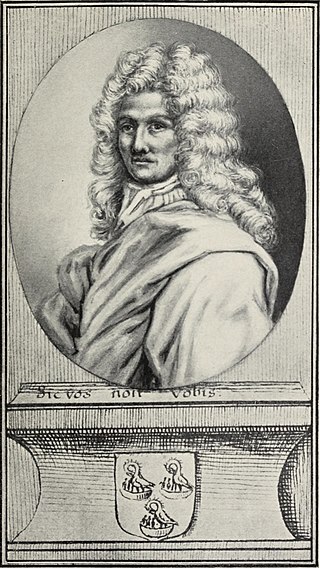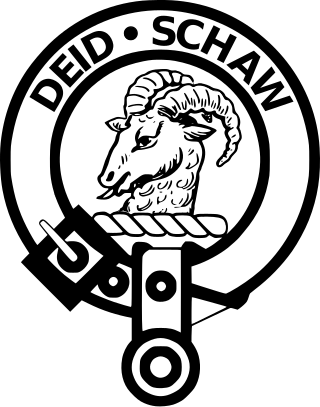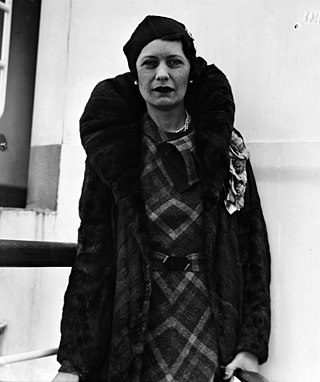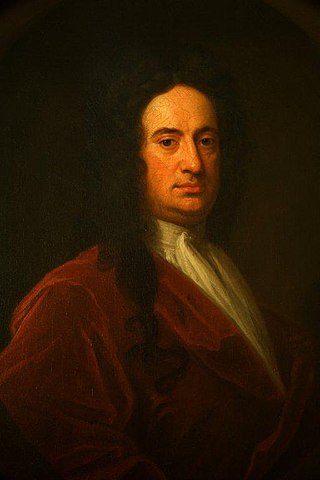Related Research Articles

Sir William Paterson was a Scottish trader and banker. He was the founder of the Bank of England and was one of the main proponents of the catastrophic Darien scheme. Later he became an advocate of union with England.

Earl of Carlisle is a title that has been created three times in the Peerage of England.
Lord Ruthven of Freeland is a title in the Peerage of Scotland. It was created in 1651 for Thomas Ruthven. He was the grandson of Alexander Ruthven, younger son of William Ruthven, 2nd Lord Ruthven. The letters patent creating the peerage is said to have been burnt with the House of Freeland in 1750, and the remainder to the peerage is not accurately known. However, as the dignity was retained on the Union Roll, it has been presumed that the honour was to heirs-general. Lord Ruthven of Freeland was succeeded by his son, the second Lord. He never married and on his death in 1722 the title and estates devolved by entail upon his youngest sister, Jean. On her death the estates passed to her nephew Sir William Cunningham, 3rd Baronet, of Cunninghamhead. He was the only son of Anne, elder sister of the third Lady Ruthven and also heir of line. He assumed the surname of Ruthven upon the death of his aunt, but lived only six months after his accession to the estates and never assumed the title.

Earl of Gowrie is a title that has been created twice, once in the Peerage of Scotland and once in the Peerage of the United Kingdom, both times for members of the Ruthven family. It takes its name from Gowrie, a historical region and ancient province of Scotland. On 23 August 1581, William Ruthven, 4th Lord Ruthven, was created Earl of Gowrie by James VI, King of the Scots. He was executed for high treason, attainted and his peerages forfeited on 28 May 1584. Two years later in 1586, the attainder was reversed and his son, the second Earl, was restored as Earl of Gowrie and Lord Ruthven, but both peerages were forfeited after the alleged plot and subsequent death of the second Earl's younger brother, the third Earl, in 1600.

The Company of Scotland Trading to Africa and the Indies, also called the Scottish Darien Company, was an overseas trading company created by an Act of the Parliament of Scotland in 1695. The Act granted the Company a monopoly of Scottish trade to India, Africa and the Americas, extraordinary sovereign rights and 21 years of exemptions from taxation.
Ruthven may refer to:

James Stuart, 2nd Earl of Bute was the son of James Stuart, 1st Earl of Bute and Agnes Mackenzie.

James Douglas, 2nd Duke of Queensberry and 1st Duke of Dover was a Scottish nobleman and a leading politician of the late 17th and the early 18th centuries. As Lord High Commissioner he was instrumental in negotiating and passing the Acts of Union 1707 with England, which created the Kingdom of Great Britain.

The Clan Ruthven is a Lowland Scottish clan.

Sir Hew Dalrymple, Lord North Berwick (1652–1737) was a Scottish judge and politician.
Lord Ruthven may refer to:

Bridget Helen Monckton, 11th Lady Ruthven of Freeland, Dowager Viscountess Monckton of Brenchley, CBE was a British peeress and Conservative member of the House of Lords best remembered as the wartime commander of women's services in India.
Events from the year 1701 in the Kingdom of Scotland.
Walter Campbell, 3rd of Shawfield and Islay and 9th of Skipness was a Scottish landowner, advocate and Rector of Glasgow University.
Major General Walter Patrick Hore-Ruthven, 10th Lord Ruthven of Freeland, 2nd Baron Ruthven of Gowrie,, known as Master of Ruthven from 1870 to 1921, was a senior British Army officer. He served as Major-General commanding the Brigade of Guards and General Officer Commanding London District from 1924 to 1928, and was then Lieutenant Governor of Guernsey until 1934.

George Baillie was a Scottish politician who sat in the Parliament of Scotland from 1691 to 1707 and in the British House of Commons from 1708 to 1734.
Sir John Maxwell of Nether Pollok (1648–1732), also known by his judicial title Lord Pollok was a Scottish politician and lawyer.
James Ruthven, Baron Ruthven FRSE (1777–1853) was a 19th-century Scottish peer and professional soldier.
Robert Blackwood of Pitreavie (1624–1720) was a 17th century Scottish silk merchant who served as Lord Provost of Edinburgh from 1711 to 1713.
Sir Archibald Muir or Mure of Thornton (c.1640–1701) was a Scottish merchant who served as Lord Provost of Edinburgh from 1696 to 1698.
References
- 1 2 Watt, Douglas (2024), The Price of Scotland: Darien, Union and the Wealth of Nations, Luath Press Limited, Edinburgh, pp. 65 - 68, ISBN 9781913025595
- ↑ Watt, Douglas, "The Company of Scotland and Scottish Politics, 1696 - 1701", in Adams, Sharon & Goodare, Julian (eds.) (2014), Scotland in the Age of Two Revolutions, The Boydell Press, Woodbridge, p. 221, ISBN 9781843839392